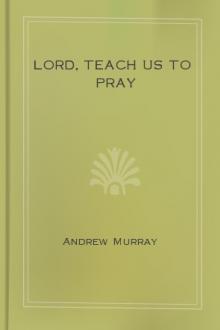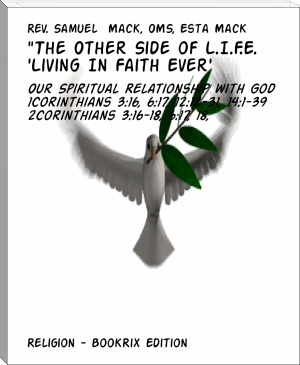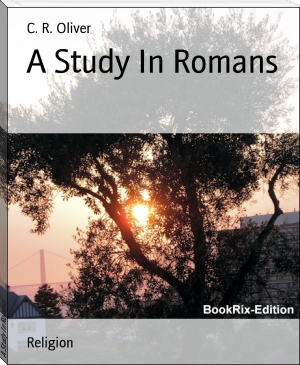THE SUPERNATURAL HABITS - PAUL & NUALA O'HIGGINS (the best e book reader .txt) 📗

- Author: PAUL & NUALA O'HIGGINS
Book online «THE SUPERNATURAL HABITS - PAUL & NUALA O'HIGGINS (the best e book reader .txt) 📗». Author PAUL & NUALA O'HIGGINS
Give How Much?
For the believer the question is not “How much must I give?” but “how much can I give?” The scriptures warn us not to give under compulsion or under impulse, but to give out of love and in a spirit of cheerful hilarity.
Since the New Testament believer's giving is an act of freedom and not compulsion, he can deliberately decide and budget how much to give. There is no doubt that the generous spirit of the New Testament indicates at least a tenth of our gross income. We who are blessed by God should immediately become blessers of others and supporters of the Lord’s work through our finances. God calls withholding the tithe and offerings “robbery.” When we withhold our tithe and offerings we rob the Body of Christ of the money it needs to do its work.
“Will man rob God? Yet you are robbing me. But you say, ‘How are we robbing thee?’ In your tithes and offerings. You are cursed with a curse, for you are robbing me; the whole nation of you. Bring the full tithes into the storehouse, that there may be food in my house; and thereby put me to the test, says the LORD of hosts, if I will not open the windows of heaven for you and pour down for you an overflowing blessing. I will rebuke the devourer for you, so that it will not destroy the fruits of your soil; and your vine in the field shall not fail to bear, says the LORD of hosts.” (Malachi 3:8-11)
In Biblical days the tithe was from the produce of the work. The farmer gave a tithe of his crop and the hired man a tithe of his income, before other expenses. The farmer was not required to give a tithe of his farm or a tithe of his trees but a tithe of the production of his farm. So too God does not normally require us to give a tithe of our estate each year but tithes and offerings off the production of the estate. In this way our work becomes a partnership with God and a vital part of His ministry on the earth. Work and business become sanctified and sacred and the divide between sacred and secular is removed.
As basic training for giving, the Bible teaches tithing. Paul says “the Law was our schoolteacher until Christ came.” (Galatians 3:24) The law taught tithing. Jesus says our righteousness should exceed that of the scribes and the Pharisees i.e. go deeper and further than the giving of the scribes and Pharisees who tithed. “For I tell you, unless your righteousness exceeds that of the scribes and Pharisees, you will never enter the kingdom of heaven.” (Matthew 5:20)
“But woe to you Pharisees! For you tithe mint and rue and every herb, and neglect justice and the love of God; these you ought to have done, without neglecting the others.” (Luke 11:42)
Here Jesus said that they were right to tithe, but tithing and religious observance are no substitutes for love. You can give without love but you cannot love without giving. We can safely say New Testament believers should seek to give at least a tithe of their gross income and increase this as the Lord blesses and prospers them. Even the poorest believer can tithe. As he does so he is declaring by his action that he believes the yoke of poverty is broken over his life and he is now beginning to be a blessing to others.
In the New Testament, because “Christ has redeemed us from the curse of the law having become a curse for us” (Galatians 3:13) there is no curse for not tithing, but there is a blessing for giving. Believers should not be threatened to give but encouraged to give as an expression of love and as a blessing.
Give Freely & Give Lovingly
When Abraham tithed to Melchizedek, the giver (Abraham) controlled where His tithe went. Later, In the Temple days the receivers (the Levites) controlled where the tithe went.
Since Jesus’ day we are no longer under the religious ordinances of the Temple priesthood. There is a new priest, Jesus and His priesthood is not Levitical but “after the order of Melchizedek.” (Hebrews 7:11) And so our giving today in the New Testament order should be patterned from the model of Abraham and Melchizedek. This means that the giver should decide where to put his tithe. The receiver should not demand the tithe but receive them. The receiver does not exercise control or ownership over the giver. The giver is related to God and God directs his giving. Melchizedek demanded nothing from Abraham but received from him. Believers today should not be hounded by legalistic controlling demands for their money but should learn to give generously, responsibly and freely. As Jesus says “freely you have received, freely give.” (Matthew 10:8) They should be encouraged to give and then respond in love to give to the Lord and His work as they freely decide and as the Spirit directs.
Those who serve the Lord should learn to look to God to send people to help them. It is a healthy thing to lean on God who uses people to meet our needs but it is manipulative to obligate people to meet them. In the best giving - receiving relationships the giver does not seek to control the receiver and the receiver does not pressurize or manipulate the giver.
The most effective giving is done in a spirit of love, freedom and faith. That which is done by mere obligation without love does not profit us (1 Corinthians 13:3). Our generosity should flow from the love that the Holy Spirit generates in our hearts. Giving in a spirit of joy, love for God, where there is no coercion, fear, or manipulation is one of the highest privileges of the believer.
“Each one must do as he has made up his mind, not reluctantly or under compulsion, for God loves a cheerful giver.” (2 Cor. 9:7)
“I preferred to do nothing without your consent in order that your goodness might not be by compulsion but of your own free will.” (Philemon 1:14)
The love of God and the Spirit of God will direct us to give. When we fail to give we not only deprive those who could be blessed by our generosity but we actually deprive ourselves of the enlargement of our heart and the increase God promises to those who are generous.
All supernaturally empowered believers are great givers. Let us ask God to give us generous hearts and enlarge our capacity to give and to bless. For the supernaturally empowered believer, giving is not a mere obligation - it is a lifestyle of fulfillment and expansion. It is a thrill and a blessing. The most supernaturally empowered believers live to give.
“The generous soul will be enriched and he who waters will himself be watered” (Pv. 11:25)
“Now as you excel in everything - in faith, in utterance, in knowledge, in all earnestness, and in your love for us see that you excel in this gracious work (giving) also.” (2 Cor. 8:7)
As we give we are aligning ourselves with God’s love and mercy. We become partners with God in supplying the needs of His children. God entrusts us with finances to give to others and makes us channels of His ministry to help others. When our motives are not tied into personal wealth but to meet the needs of others there is almost no limit to what God can channel through us.
Chapter 5: THE HABIT OF FORGIVING
CHAPTER V
THE HABIT OF FORGIVING
The habit of forgiveness is the most liberating habit of the effective disciple. The supernaturally empowered believer is energized with a new ability to forgive everyone because he carries the life of the Great Forgiver within Himself. All kingdom living is based on the primary reality that, through the atoning sacrifice of Jesus, our sins and lawless deeds are forgiven. Through faith in this great historical fact we stand in a new acquitted relationship with God.
“Come now, let us reason together, says the LORD: though your sins are like scarlet, they shall be as white as snow; though they are red like crimson, they shall become like wool.” (Isaiah 1:18)
Jesus’ death totally atoned for all our sins, mistakes, and wrong thinking. When we deliberately and personally appropriate these benefits our sins are forgiven, erased from the record, and we receive the gift of eternal life. God has no more charges against us because He has “laid on Jesus the iniquity of all of us.” (Isaiah 53:6) Our part is to believe and receive this shockingly wonderful reality. God paid the penalty of our guilt while we were sinners. “For while we were yet weak, in due season Christ died for the ungodly. For scarcely for a righteous man will one die: for peradventure for the good man some one would even dare to die. But God commends his own love toward us, in that, while we were yet sinners, Christ died for us. Much more then, being now justified by his blood, shall we be saved from the wrath of God through him.” (Romans 5:6-9)
Forgiveness is not just that God overlooks our sin and says: “It doesn’t matter’. He did not simply overlook our sin and forgive it - He paid a horrible price to bear our sin.
“All we like sheep had gone astray had turned every one to his own way, but the Lord has laid on Him the iniquity of us all.” (Isaiah 53:6) The forgiveness available through the atoning sacrifice of Jesus is far greater than simply overlooking offence. God did not simply overlook our offences - He paid for them. The demands of justice were perfectly satisfied when Jesus took the wages of our sin.
The atoning sacrifice creates a new reality. The veil of the Temple is torn down. The barrier which sin created between man and God is breached. There is now an open heaven available to all who come through Jesus. With sins forgiven and cleansed we can now approach God without any sense of inferiority and guilt and stand - in spite of our past sins – in an acquitted relationship with Him. The love of God now comes pouring into our hearts by the Holy Spirit like water through an open tap.
“And you, being dead in your sins and the uncircumcision of your flesh, He has made alive together with Him, having forgiven you all trespasses, blotting out the handwriting of ordinances that was against us, which was contrary to us, and has taken it out of the way, nailing it to the cross.” (Colossians 2:13-14)
Jesus has not destroyed the law but He has blotted out the written judgments





Comments (0)